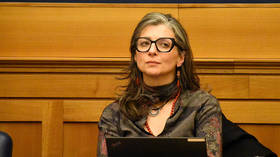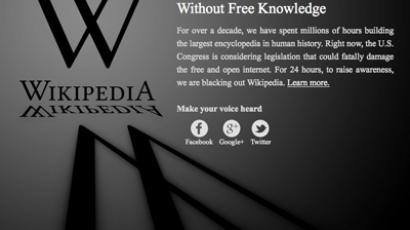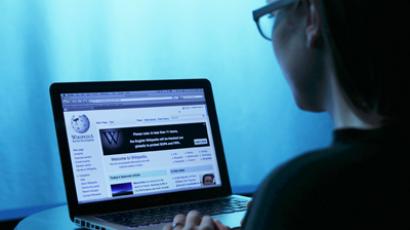SOPA, PIPA would change free and open web – Jay Walsh
As Wikipedia joined a 24-hour protest against two anti-piracy bills making their way through the US Congress, Jay Walsh of the Wikimedia foundation told RT he hopes the new laws will not be passed.
If passed, the Stop Online Piracy Act and the PROTECT IP Act would allow the government to block search engine links to any website which may contain what is perceived as copyright material. The laws are designed to protect people’s work from being shared without permission or payment, but Internet campaigners say they could cripple the Internet as we know it.Jay Walsh, the head of communications at the Wikimedia foundation, the umbrella organization in charge of Wikipedia, said in an interview with RT that Wikipedia's message has been seen by millions of people now.“What we know is that this legislation would certainly change the free and open web that exists right now, the ability for people to easily collaborate across borders, to talk about information, to build sites like Wikipedia – it’s going to be threatened and challenged by this for a whole variety of reasons, but that’s going to fundamentally change the way the Internet works. There are already good provisions in the US right now – not excellent, but they are successful provisions – to prevent sharing of copyrighted information, but these proposed tools would just go way too far.”
The head of communications at the Wikimedia foundation says that this legislation, if passed, would without a doubt affect people outside the US – their ability to share information between sites and to collaborate widely from all over the world would be seriously obstructed.
Walsh agrees that certain measures should be taken to fight online piracy, but these should not threaten freedom of the web.
“Within Wikipedia, our mission is to share knowledge freely, but the Wikipedia community is highly tuned to the realities and laws incorporated in the US, because that’s where our services are. So, our audience understands what’s legal, what needs to be taken up. How to present a solution really is an important question, I don’t have a particularly good answer for it. What we do know is that looking at this legislation, it is an effort to curb online piracy – which is important, and I think everybody in the community would agree that we need that – but the reality is that we can’t do it with a device that also dramatically damages the freedom of the web.”














